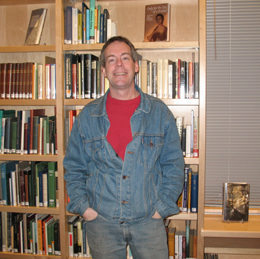In Town
Billions and billions of times there has been a man
like this one. He enters town for the first time –
a city that has finally hired him. This is it.
It’s beginning, the story he worked so hard to tell.
He deserves his story – or wants to hope he does.
For what is deserving if not the flower of work?
What? He’ll work hard. He’ll do work that is good.
What blindsides him is his very first lunchtime: he is
actually free to have lunch, has to tell no one,
just go down and get lunch at the lunch truck,
always on the sun side of his building (he calls
it “his” now). Warm, sunshot, safe – everyone likes the sun.
He belongs in line. This is how it will be:
arrival, work, noon, lunch: he is finding his place, starling
in a flock, unfurling hours and hours. It’s almost his
turn. He must decide, fingers bills and coins in his
pocket. People order bizarre lunches, food he would never order.
When it’s one more person to go and then him,
a voice says, “Any change, man?” He follows the voice
to the vision: man, dirty; clothes/face/hair, dirty. Realizes
he’d noticed the smell in line but not the man –
resents the words, rude as the world; resents this city
that forces up such faces, imbalances man against man. He
resents the disadvantage of advantage, where he stands, something he
had not written into the story. The dirt man says
again – the man in line sees he’s wrong, looks for
someone else to blame. The dirt man’s words pull a
bill from the clean man’s pocket. Lunch poisoned, he can
no longer work in happiness. He doesn’t know, cannot decide;
this is not his to heal. Yet he takes to
walking with pockets loaded with coins, and as they all
cry for change, change, he gives, drowns. It’s not working.
There couldn’t be enough quarters in the world. And they
will never stop. They don’t see him, his unhappiness with
them, with being wrong, he and they locked in sickness.
Sinking, grows heavy, heavier, so he stops, walks long streets
to work, pockets empty, unresponsive chorusmaster of a failure choir,
though he cannot decide who besides himself has failed. One
day he comes to work at an empty office, works
hard, alone. His floor explodes, blows out a side of
his building, blows his body clean out over the river;
he strikes the river. Fury, breathless, confused enclosure. He’s OK – he can move – the surface – buckling mirror – he can get
there – he can survive – he’s a good worker – strong arms,
legs – knows where air/warmth/light are – knows he can –
but the surface flees him – he works – the surface recedes –
he thrashes – the surface tinges green – he flails – the surface
obscures, shuts away, something dragging him down, pockets heavy, pulling
him. He’s falling, water permissive, penetrable as air. He’s plummeting
toward the bottom, mud over his head. When he wakes,
he is sitting in the gutter and the people in
line at the lunch truck ignore his cries for change.
John Timpane is the Associate Editor of the Editorial Board of the Philadelphia Inquirer. His books include Writing Worth Reading (coauthored with Nancy H. Packer), It Could Be Verse, and Poetry for Dummies (coauthored with Maureen Watts and the Poetry Center at San Francisco State University). His poetry has appeared in Sequoia, Northeast Corridor, 5_Trope, Eight Millennial Voices, Bucks County Writer, Live Oak, Wild River Review, and elsewhere. He is married to Maria-Christina Keller, copy executive at Scientific American. They live in Lawrenceville, N.J., with their children, Pilar and Conor.

Leave a comment